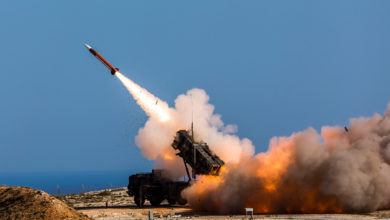Germany extends ban on arms exports to Saudi Arabia by a further six months
German Chancellor Angela Merkel’s coalition government has extended by six months an embargo on weapons exports to Saudi Arabia.
“The order to halt authorized weapons exports to Saudi Arabia is extended by six months from March 31 to September 30, 2019,” government spokesperson Steffen Seibert said in a Thursday, March 29 statement. “Over this period no new export applications will be approved.”
But the government also agreed a nine-month extension for export licenses that have already been granted, provided that weapons systems are not delivered until the end of the year, meaning that manufacturers do not need to apply for a new license, Reuters reported.
The government also called on France and the U.K. to ensure that weapons delivered to Saudi Arabia or the United Arab Emirates would not be deployed in Yemen, Deutsche Welle reported.
The freeze on weapons sales to Saudi Arabia and other countries involved in the war in Yemen was instituted last October in response to the murder of Saudi journalist Jamal Khashoggi and temporarily extended earlier this month.
Germany is among the world’s top arms exporters, a group led by the United States that also includes Russia, China, France and the United Kingdom. Germany’s arms exports to Saudi Arabia topped $105 million (€92.9 million) last year.
Weapons containing German components that are manufactured and sold by another country are also affected by Germany’s export freeze, leading to opposition to the ban from within the German government coalition and from European Union partners because of it its impact on joint defense projects such as the reported £10 billion ($13 billion) sale of 48 Eurofighter Typhoon jets to Riyadh led by the U.K.’s BAE Systems.
But while France and the United Kingdom have long urged Germany to end the export ban, human rights groups argue it should stay in place – a view that has many backers among the centre-left Social Democratic Party, junior partners to Merkel’s conservative Christian Democratic Union/Christian Social Union in Bavaria bloc in the coalition federal government.
Polls earlier in March showed that around two-thirds of German citizens rejected weapons exports.
“We oppose defense exports to dictatorships and into active conflict zones,” SPD deputy leader Ralf Stegner said on public TV.
Merkel’s CDU/CSU favored resumed sales, at least for joint European defense projects.
“Another unilateral German stop to defense exports, imposed without coordination with European and NATO partners, would be wrong and dangerous,” its economic policy spokesperson Joachim Pfeiffer told the Passauer Neue Presse daily.

Rights violations in Yemen
This week, French ambassador Anne-Marie Descotes criticized Germany’s “unpredictable” arms export policy and pointed out that some companies in the sector were marketing products as “German free” in terms of components.
A German security council meeting Wednesday failed to resolve the issue, media reports said, leading to further discussions Thursday.
One reported compromise proposal was to give the green light to multinational defense products with a German share of no more than 20 percent.
Stegner urged “a sensible solution,” stressing that the SPD too wants Germany to cooperate with other European powers on joint defense projects.
Media reported another idea on the table would be for Germany to hold onto six naval patrol vessels and a training ship ordered by Saudi Arabia. Media group RND said that if the Saudi export stop was extended by six months, the German state could buy the ships for its navy, customs service and federal police.
About 10,000 people are officially estimated to have been killed in the Yemen war since March 2015, though rights groups say the death toll is much higher.
This week more than 20 non-government groups operating in Yemen wrote to Merkel to urge her to maintain the freeze, citing the “great risk” that the arms would be used to “facilitate violations of international humanitarian law and human rights.”
Other European nations have imposed bans on arms exports to Saudi Arabia.
On November 22, Finland said it would not allow new arms export authorizations to Saudi Arabia or the United Arab Emirates over the situation in Yemen, following a decision by Denmark’s foreign minister to suspend exports of military equipment to Saudi Arabia due to concerns over the Yemen war and Khashoggi’s murder.
On November 9, Norway said it would freeze all defense material export licenses to Saudi Arabia, including those for dual-use items.
But some other countries have stuck by the kingdom rather than use lucrative arms deals. In September, Spain said it will go ahead with the delivery of 400 laser-guided bombs to Saudi Arabia, after earlier saying it would block the sale. The u-turn came amid concerns that cancellation of the deal could have jeopardized a €1.8 billion order of five Corvette warships.
EU allocates €525 million for defense projects including Eurodrone
With reporting from AFP












